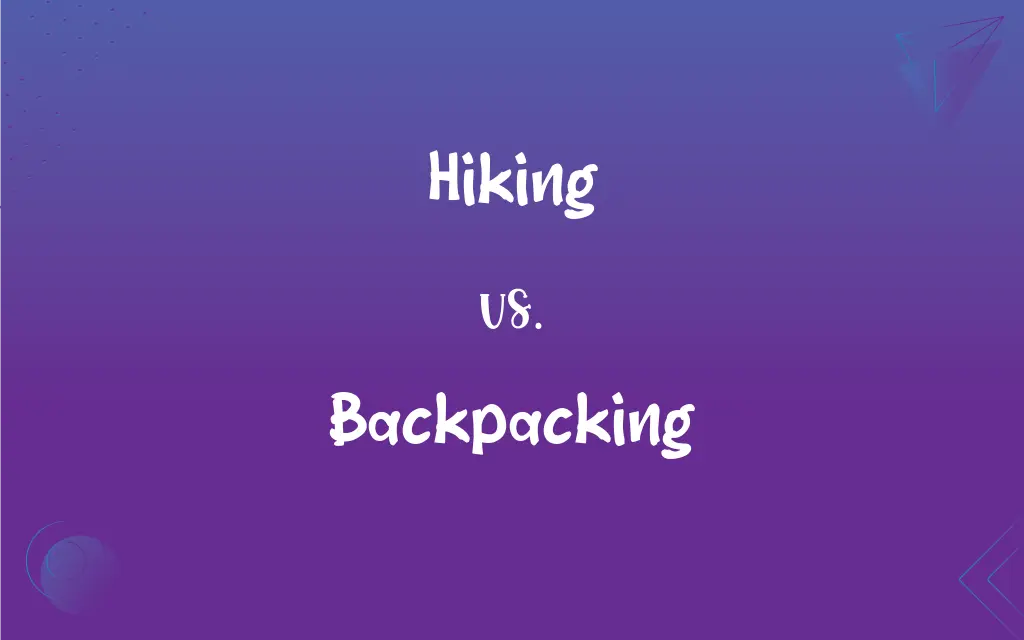Hiking vs. Backpacking: What's the Difference?
Edited by Harlon Moss || By Janet White || Published on March 16, 2024
Hiking involves walking on trails for leisure or exercise, typically lasting a day, while backpacking is an extended form of hiking involving carrying gear in a backpack for multiple days of camping and trekking.

Key Differences
Hiking is an outdoor activity that involves walking on trails or paths, usually for pleasure or exercise, and is typically done within a day. Backpacking, on the other hand, is a more extended form of hiking that involves carrying all necessary gear, such as food, shelter, and clothing, in a backpack for overnight stays or multiple days in the wilderness.
The primary focus of hiking is on the experience of walking and enjoying nature, often on well-marked trails in parks or natural areas. Backpacking requires additional planning and preparation, as it involves camping and self-sufficiency in remote locations, often off the beaten path.
Hiking gear is usually minimal, consisting of comfortable shoes, water, and perhaps some snacks. Backpacking gear is more extensive, including a tent, sleeping bag, stove, and food supplies, as the backpacker must be prepared for various conditions and longer durations.
The physical demands of hiking can vary from easy walks to challenging climbs, but it generally requires less endurance than backpacking. Backpacking demands a higher level of physical fitness and endurance, as it involves carrying a heavier load and covering longer distances.
Safety considerations for hiking include staying on marked trails and being aware of weather conditions. For backpacking, additional safety measures are crucial, such as navigation skills, wildlife awareness, and knowledge of backcountry survival techniques.
ADVERTISEMENT
Comparison Chart
Duration
Typically a day trip
Multiple days to weeks
Gear
Minimal, e.g., water, snacks
Extensive, e.g., tent, sleeping bag
Purpose
Leisure, exercise
Adventure, exploration
Trails
Well-marked, easier
Off-trail, more challenging
Physical Demands
Varies, generally less demanding
More demanding, requires endurance
ADVERTISEMENT
Hiking and Backpacking Definitions
Hiking
Hiking is the activity of going for long walks in the countryside for pleasure.
We went hiking in the mountains last weekend.
Backpacking
Backpacking is the practice of carrying gear and supplies in a backpack for camping, hiking, or travel.
He's planning a backpacking trip through the national forest.
Hiking
Hiking is walking for a long distance, especially across country or in the woods.
They planned a hiking trip through the national park.
Backpacking
Backpacking is an outdoor adventure that combines hiking with backcountry camping.
Their backpacking adventure took them through remote wilderness areas.
Hiking
Hiking is the act of walking on trails or paths, typically for leisure or exercise.
Hiking in the forest is a great way to get exercise and enjoy nature.
Backpacking
Backpacking is the activity of traveling or camping while carrying all your belongings in a backpack.
They went backpacking across Europe last summer.
Hiking
Hiking is an outdoor activity of walking in natural areas on pre-charted paths called trails.
They went hiking along the coastal trail to enjoy the ocean views.
Backpacking
Backpacking is a form of low-cost, independent travel that involves carrying a backpack with essentials.
Backpacking through the mountains can be a challenging but rewarding experience.
Hiking
Hiking is a recreational activity involving walking in natural environments, often on hiking trails.
She loves hiking and spends most weekends exploring new trails.
Backpacking
Backpacking is a form of travel or exploration that involves carrying all necessary equipment in a backpack.
Backpacking in the desert requires careful planning and water management.
Hiking
To go on an extended walk for pleasure or exercise, especially in a natural setting.
Backpacking
A sturdy bag designed for carrying articles on a person's back, having shoulder straps and often mounted on a lightweight frame.
Hiking
To rise, especially to rise upward out of place
My coat had hiked up in the back.
FAQs
What is backpacking?
Backpacking is an extended form of hiking that involves carrying all necessary gear in a backpack for multiple days of camping and trekking.
What is hiking?
Hiking is an outdoor activity that involves walking on trails or paths, typically for pleasure or exercise, usually lasting a day.
What gear do I need for hiking?
For hiking, you typically need comfortable shoes, water, snacks, and appropriate clothing for the weather.
How do I prepare for a hiking trip?
Prepare for a hiking trip by choosing an appropriate trail, checking the weather, packing necessary supplies, and informing someone about your plans.
What gear do I need for backpacking?
For backpacking, you need more extensive gear, including a tent, sleeping bag, stove, food, water filter, and navigation tools.
What are some safety tips for hiking?
Safety tips for hiking include staying on marked trails, carrying a map and compass, staying hydrated, and being aware of wildlife.
What are some safety tips for backpacking?
Safety tips for backpacking include knowing how to use your gear, being prepared for emergencies, packing a first-aid kit, and knowing your physical limits.
Can I go hiking in any weather?
You can go hiking in various weather conditions, but it's essential to dress appropriately and be prepared for sudden changes.
How do I prepare for a backpacking trip?
Prepare for a backpacking trip by planning your route, packing essential gear, obtaining any necessary permits, and practicing Leave No Trace principles.
How do I choose a backpacking route?
Choose a backpacking route based on your experience, the terrain, water sources, and campsites.
What is the difference between hiking boots and trail shoes?
Hiking boots provide more ankle support and protection, while trail shoes are lighter and more flexible.
What are some common mistakes to avoid while hiking?
Common mistakes to avoid while hiking include overpacking, wearing new shoes, and not checking the weather.
How do I choose a hiking trail?
Choose a hiking trail based on your fitness level, desired scenery, and available time.
What are some common mistakes to avoid while backpacking?
Common mistakes to avoid while backpacking include underestimating the terrain, not testing gear beforehand, and neglecting Leave No Trace principles.
How do I stay hydrated while hiking or backpacking?
Stay hydrated by carrying enough water, using a water filter or purification tablets, and drinking regularly.
How can I minimize my impact on the environment while hiking or backpacking?
Minimize your impact by staying on trails, packing out trash, respecting wildlife, and following Leave No Trace principles.
What should I do if I encounter wildlife while hiking or backpacking?
If you encounter wildlife, keep your distance, avoid feeding them, and follow guidelines for specific animals like bears or snakes.
What should I pack for a day hike?
For a day hike, pack water, snacks, a map, a first-aid kit, and layers for weather changes.
What should I pack for a multi-day backpacking trip?
For a multi-day backpacking trip, pack a tent, sleeping bag, stove, food, water treatment, and clothing layers.
Can I go backpacking alone?
You can go backpacking alone, but it's recommended to have experience, let someone know your plans, and carry emergency communication devices.
About Author
Written by
Janet WhiteJanet White has been an esteemed writer and blogger for Difference Wiki. Holding a Master's degree in Science and Medical Journalism from the prestigious Boston University, she has consistently demonstrated her expertise and passion for her field. When she's not immersed in her work, Janet relishes her time exercising, delving into a good book, and cherishing moments with friends and family.
Edited by
Harlon MossHarlon is a seasoned quality moderator and accomplished content writer for Difference Wiki. An alumnus of the prestigious University of California, he earned his degree in Computer Science. Leveraging his academic background, Harlon brings a meticulous and informed perspective to his work, ensuring content accuracy and excellence.































































